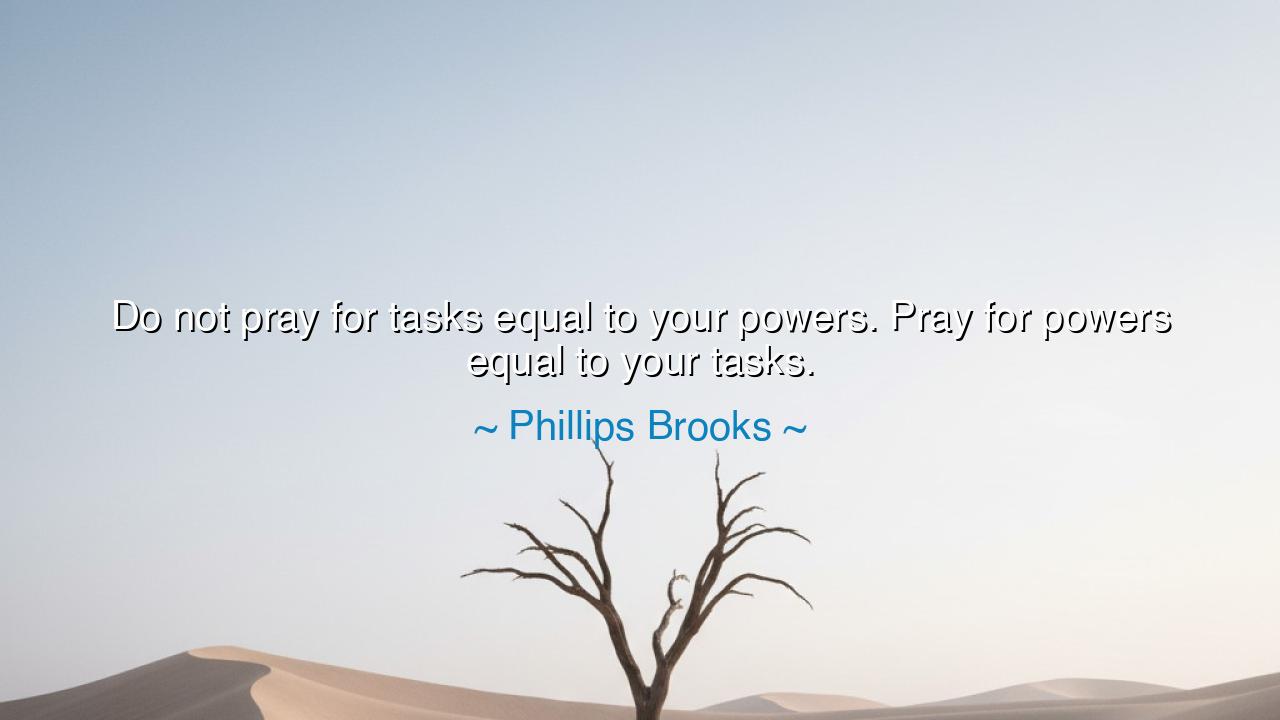
Do not pray for tasks equal to your powers. Pray for powers






Phillips Brooks, preacher of hope and builder of souls, spoke with the voice of eternal courage when he declared: “Do not pray for tasks equal to your powers. Pray for powers equal to your tasks.” In this saying he calls the heart to rise above mediocrity, to seek not ease, but challenge. For a task that is small enough for one’s strength brings no growth, no fire to the spirit. It is the greater task, beyond present ability, that summons forth hidden reserves, that awakens the divine within man.
The foolish prayer asks for a life free of struggle, for burdens light and victories easy. But the wise prayer asks for strength to meet the mountains placed in our path. This is the way of the heroes, of the saints, of the visionaries: they do not shrink their destiny to fit their strength, but enlarge their strength to fit their destiny. Brooks, in this exhortation, teaches that greatness is not in seeking smaller battles, but in becoming strong enough to face the battles we are given.
History thunders with examples. Consider Abraham Lincoln, who entered the presidency with no task equal to his power, but with a burden that dwarfed it—the preservation of a nation torn by civil war. Had he prayed for lesser work, he would have sought escape. Instead, he grew into the powers required of him, bearing the weight of emancipation and union. His strength was not equal to his task at the beginning, but it became so through endurance and faith.
So too with Mother Teresa, who did not ask for lighter labors, but for a heart equal to the suffering she witnessed. To embrace the dying, to comfort the forgotten, required more than human strength—it demanded powers of love, compassion, and patience that grew only in the fire of her calling. Her life proves Brooks’s truth: the greatest tasks are not reduced to fit us; we are expanded to meet them.
O children of tomorrow, engrave this upon your hearts: do not pray for easier roads, but for stronger feet; do not pray for lighter loads, but for broader shoulders; do not pray for lesser destinies, but for greater souls. For powers equal to your tasks will be given to those who dare to rise. Brooks’s words are both challenge and promise: your trials are not too great, but your strength is yet to be revealed. Go forth, then, and grow into the greatness your tasks demand.






HNHuynh Hai Nam
This saying hits home for anyone facing responsibility beyond their confidence. It’s humbling—it tells us not to shrink our ambitions to fit our current abilities, but to grow into something greater. Still, it makes me curious about how people actually cultivate those ‘powers.’ Is it through faith, discipline, experience, or suffering? I’d love to hear how others interpret the process of becoming strong enough for their purpose.
LSLight Shine
There’s something deeply spiritual about this idea. It reframes prayer from seeking comfort to seeking transformation. I interpret it as an invitation to align our inner power with our calling. But I’d like to ask: how do we know when a challenge is meant to shape us versus when it’s breaking us? Sometimes perseverance feels virtuous, yet other times it feels like denial or avoidance.
GDGold D.dragon
Reading this makes me reflect on how often we ask life to be easier instead of asking ourselves to become better equipped. It’s a beautiful reminder of resilience and purpose. Yet, I can’t help but think—what if the task itself is unjust or destructive? Should we still seek strength to face it, or have the courage to walk away? Perhaps discernment is just as important as endurance.
NPNguyen Ngoc Phu
I love the empowering message here—it’s about courage and faith in one’s potential. Still, I question whether it unintentionally glorifies struggle. Should we always seek to meet daunting challenges, or can we also choose peace and simplicity without guilt? Maybe the deeper wisdom lies in knowing which tasks are truly worth stretching ourselves for, and which ones only drain our energy without meaningful growth.
TNDiem Cao thi ngoc
This quote inspires me to think about growth and humility at the same time. It suggests that instead of wishing for easier challenges, we should hope to become stronger individuals. But I wonder, how realistic is that mindset when people already feel overwhelmed? Is it always noble to take on more than we can handle, or should we sometimes recognize our limits and seek balance instead of expansion?